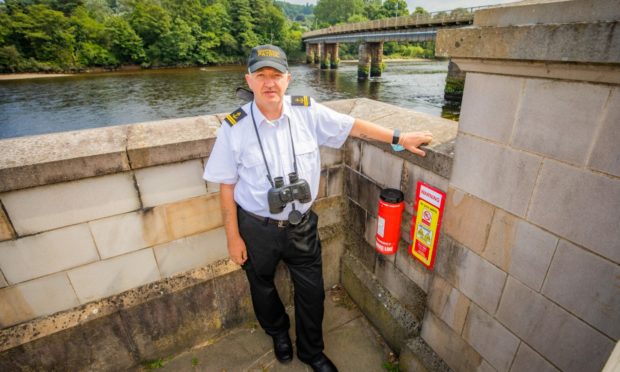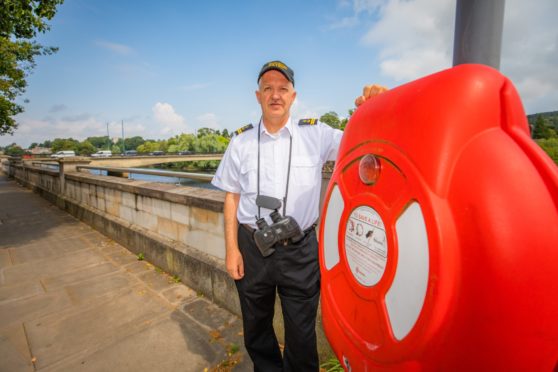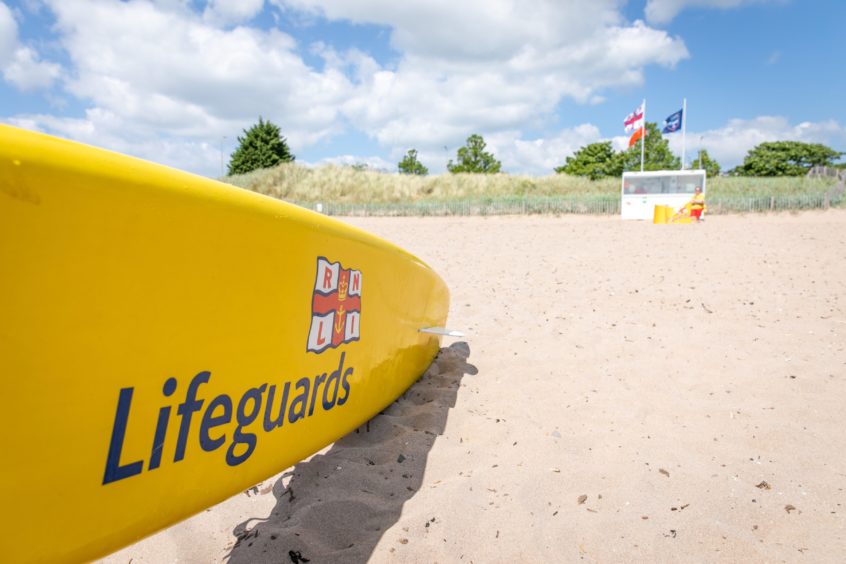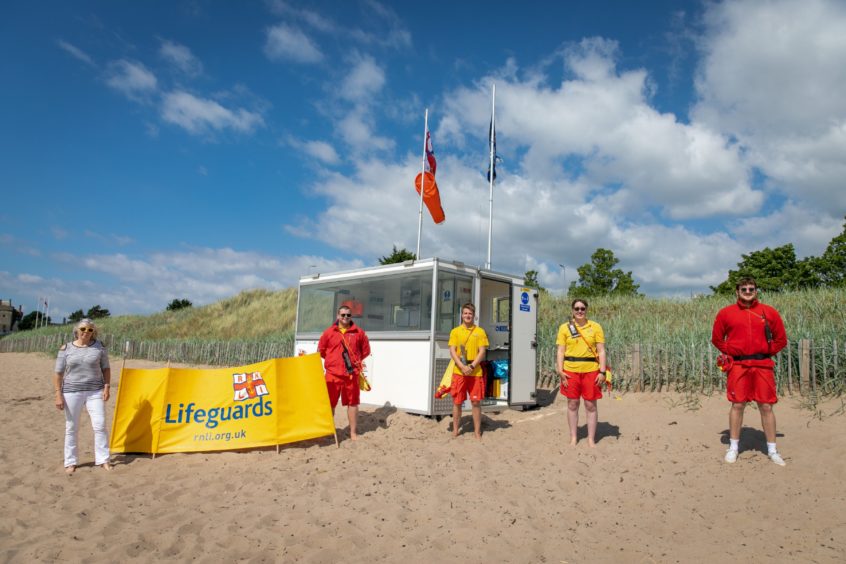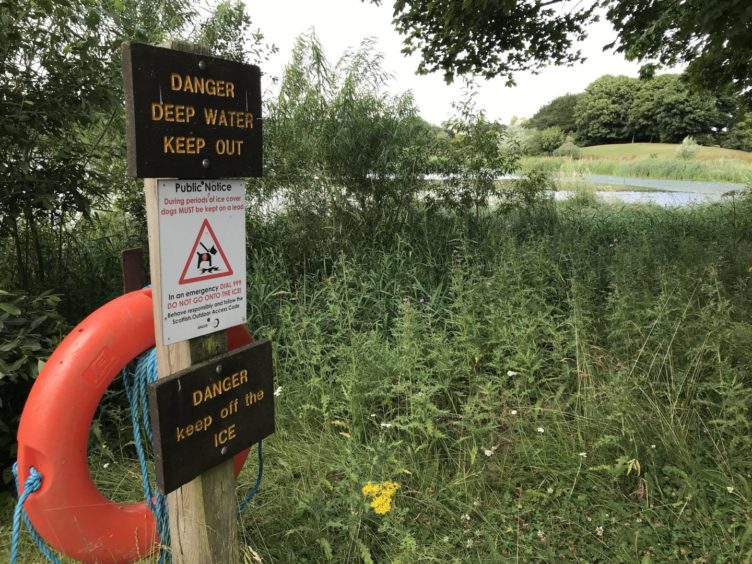Don’t be a hero – that’s the stark warning from experts in the wake of water tragedies and near misses across Scotland last weekend.
Coastwatch Tay has added its voice to guidance delivered by emergency organisations such as the RNLI, Coastguard and fire service after six deaths in two days in Scottish waters.
Its message also follows several dramatic rescues in Tayside and Fife, which could have had a devastating outcome.
Coastwatch Tay looks after the dozens of items of lifesaving equipment along the banks of the River Tay from Monifieth to Dundee airport.
The volunteers share the sorrow and concern around recent events – but hope the high-profile tragedies will help drive home the education message around staying safe in the sea, lochs and rivers.
Their advice comes as we reveal an interactive map of which beaches in our area have lifeguards on duty.
This will allow people to choose the safest places to swim this summer.
‘It’s all about education’
Coastwatch Tay deputy station manager William Brown said: “We want to help get the message out that if you see someone in trouble then make a 999 call – don’t go in yourself.
“If it’s at the coast, then it is 999 and ask for the coastguard. If it is in a loch or river inland then it is 999 and ask for the fire service.”
He added: “It is all about education.
“Sadly we are seeing these tragedies, but people should not put themselves at risk by going in after someone.”
There has been a strong of recent local incidents including a young girl helping a boy in trouble in the River Tay in Perth and the rescue by two men of a group of girls caught in a Lunan Bay rip current.
Fortunately, they had good outcomes, but even rescuers realised in hindsight the danger they had put themselves in.
William continued: “The thing about it is that whether it’s adults, youths or children, people don’t realise that the temperature of the sea or lochs and rivers doesn’t get any greater during the summer weather and that’s when they get cold shock.”
Coastwatch Tay is also keen that increased awareness might help bolster volunteer numbers and speed up a planned expansion into Perth.
William said: “We’re all volunteers and cover Dundee, Broughty Ferry and Monifieth.
“The provision of equipment such as lifebelts and throw lines is down to each local authority but a couple of years ago we took over doing the inspections for Dundee City Council.
“We’re not coastguard or rescuers, we’re purely trained observers.
Float to Live
The RNLI says anything below 15°C is defined as cold water and can seriously affect breathing and movement.
Average UK and Ireland sea temperatures are just 12°C.
William points to advice from organisations such as Water Safety Scotland and the RNLI’s Float to Live message to increase chances of survival.
He added: “People need to recognise where there is lifesaving equipment that they can use in these situations.
“In Perth, for instance, they don’t just have buoyancy aids, there are throw ropes along the river. People may have run right past them and then put themselves at risk by going into the water.”
He continued: “We are down in numbers now due to Covid and there are only around seven of us, but we’ve made a commitment that we’ll go out at least once a week and inspect the equipment.
“There are 41 pieces along the stretch we cover so it is quite a big undertaking, but it is important it is there for when it might be needed.
“It is all about education – what to do if you see someone in the water and what to do if you get into trouble.
“We have been pretty busy all the way through the pandemic and have seen all of the situation with inflatables, paddleboards and just people heading to the great outdoors in the good weather.
“All of these things can get you into trouble quickly if you’re blown out to sea or fall off.”
Do you know where the lifeguarded beaches are?
Expert advice is for people to swim at lifeguarded beaches if possible.
At a string of locations along the Tayside and Fife coast people can take a dip with the added security of being under the eye of trained lifeguards.
Broughty Ferry beach became the latest addition to the RNLI’s list of lifeguarded beaches in June and their trained personnel are operating daily until September.
In Fife, the RNLI operate lifeguards at East and West beaches in St Andrews, Burntisland, Elie Harbour beach, Leven and Aberdour Silver Sands.
Councils’ plea
Local authorities reinforced the message for people to head to lifeguarded beaches.
Fife Council’s Safer Communities manager Patricia Spacey commented: “The safety of residents and visitors to our beautiful coast, lochs and rivers is a high priority for Fife Council.
“We have over 140 miles of coastline and we work with partners and landowners to make sure people’s safety is considered at all times.
“Public rescue equipment is available at all 14 designated beaches and council owned harbours and piers. Six beaches also have RNLI beach lifeguard cover over the summer holidays.
“A recently-formed Water Safety Group which brings together organisations including Fife Coast and Countryside Trust, the Coastguard, Scottish Fire and Rescue Service, Police Scotland and RNLI will also be working to consider water safety issues across Fife.
“As always our advice is to take care beside open water, and swim in areas where there is a designated lifeguard.”
A Perth and Kinross Council spokesperson said: “Most drowning occur in open water which is why Perth and Kinross Council and the Perth and Kinross Water Safety Partnership have placed water safety signs and public rescue equipment, most often throw lines, in waterside locations across Perth and Kinross, including by the River Tay near Moncreiffe Island.
“However, we would urge people to follow the Water Safety Code and only swim in open water in places where there are lifeguards present.”
An Angus Alive countryside adventure spokesperson said: “We have seen increasing situations during the fine weather where members of the public have been swimming in our open water spaces at our country parks.
“We would like to remind everyone that swimming is not permitted at any time in any of our open water spaces unless part of a supervised water activity or swimming session.”
